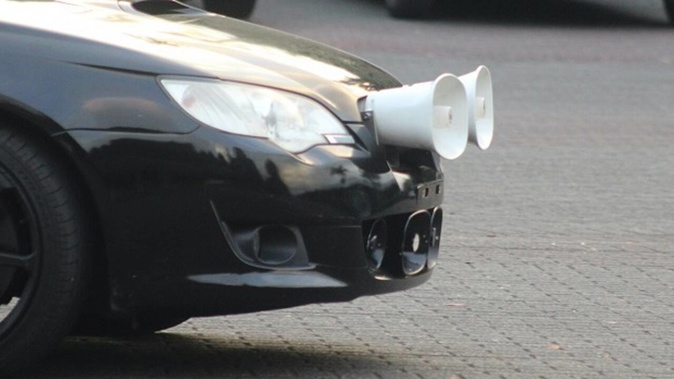
The growing siren battle subculture across Auckland is thought to be putting lives at risk as tsunami siren theft and vandalism escalates.
In the past six months, Auckland Emergency Management said 22 siren units have been stolen from west coast areas while nine were taken from areas on the east coast.
Auckland Emergency Management (AEM) head of capability and public awareness Adam Maggs said the behaviour had picked up again in recent weeks and said it was "unacceptable".
An AEM spokesperson later told the Herald that they suspect the sirens were being stolen for siren battling and installation on vehicles.
"These sirens are specifically designed for alerting and are of no use for any other purpose such as playing music."
Sirening is the subculture that sees music played through loudspeakers attached to bicycles and cars. It takes its name from the siren-shaped speakers often fitted to the front of vehicles.
Sireners, who are usually part of "crews", play a mix of music but tracks with high treble suitable for the siren speakers dominate.
There are "battles" across Auckland most Saturdays, with crews vying to see whose sirens are loudest and clearest.
/cloudfront-ap-southeast-2.images.arcpublishing.com/nzme/4THC775F75K3ZLDMTTKAIN75LM.jpg)
Thieves and vandals are targeting tsunami sirens in west coast areas of Auckland. Photo / File
Thieves and vandals have recently targeted sirens at Huia, Whatipu, Karekare, Piha and Te Henga.
"These sirens are specifically designed for alerting and are of no use for any other purpose, including playing music, making this a malicious and wasteful act of vandalism," said Maggs.
"The loss of sirens means that the audible warnings for a tsunami threat at these locations may not be functioning at full capacity or as you might expect – for example, some areas may have fewer operating sirens."
A police spokesperson said inquiries into the incidents are ongoing but no arrests have been made at this stage.
The money to fix or replace the sirens comes out of the ratepayers' pockets, Maggs said.
"They are also not an 'off-the-shelf' product, which means they cannot simply be replaced."
AEM is currently looking into replacement options but sourcing products offshore, international shipping requirements and the long-term sustainability of a product prone to vandalism is weighing heavily - all which determine the costs.
Maggs says fortunately sirens are only one way to be informed of the threat of tsunami.
"Warnings will be sent by Emergency Mobile Alert [messages to your mobile phone], broadcast on radio and television or via the news media, and social media platforms," he said.
"And of course, if you are at the coast and feel an earthquake which is long or strong, move inland or to higher ground immediately."
Police ask anyone with information about the recent incidents to contact them on 105.
Information can also be provided anonymously via Crime Stoppers on 0800 555 111.
"Additionally, anyone who witnesses suspicious behaviour at any time should call 111 immediately."
Take your Radio, Podcasts and Music with you









